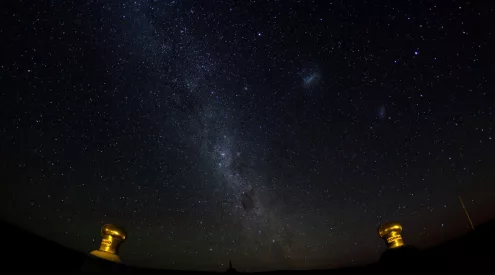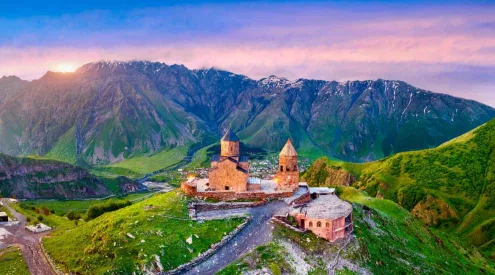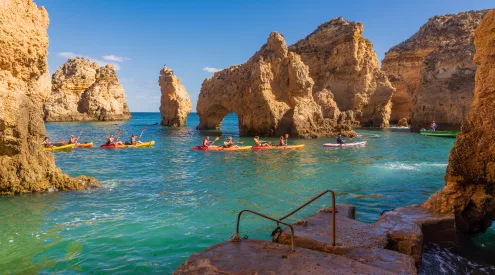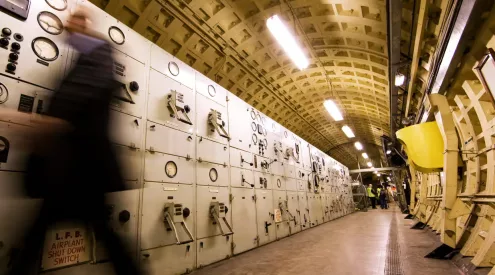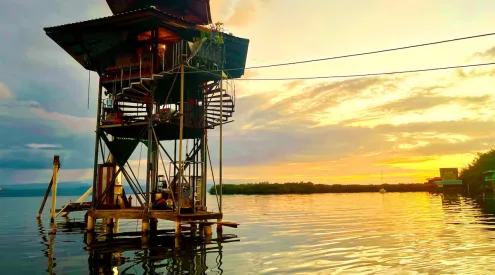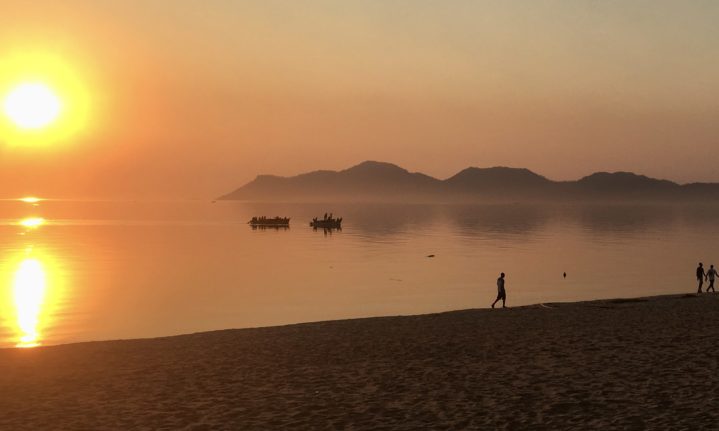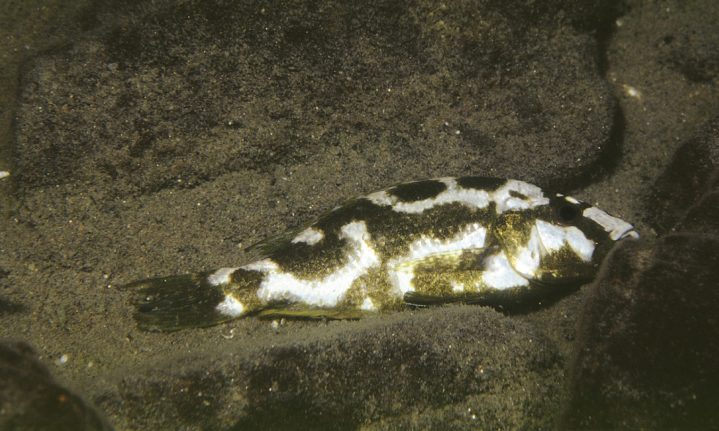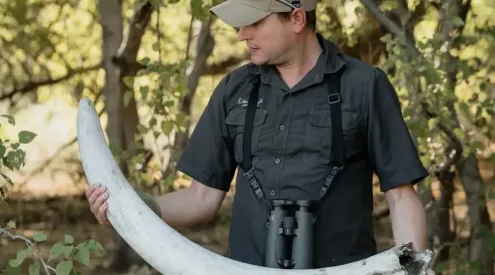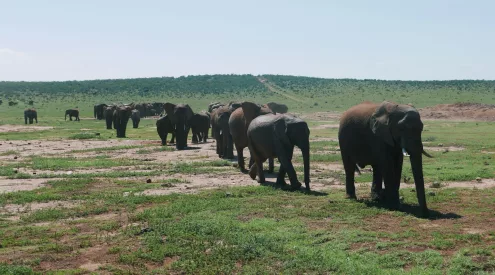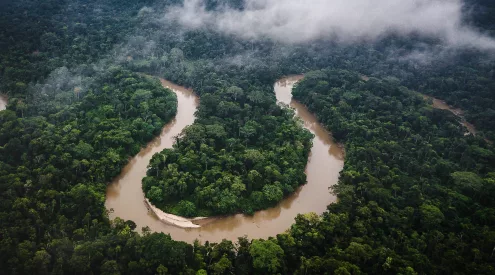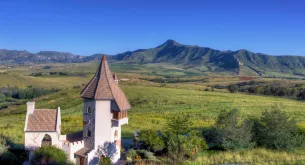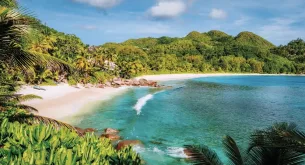By Jeffrey Barbee
In the shallow rocky waters below a high granite outcrop a fish lies sideways, fallen onto the sand below. Its skin the hue of a rotting corpse, the fish is unmoving, apparently dead. But looks can be deceiving. As scavenger fish approach, the play-dead fish springs into action, snapping up the would-be eaters in a flurry of motion. One of hundreds of new fish species discovered in the warm waters of Lake Malawi in the last four decades, the play-dead fish’s only home is now in danger of being destroyed.

Play dead fish Nimbochromis livingstonii. Picture: allianceearth.org
Lake Malawi National Park is a loose collection of protected hills, islands and coastal areas in the south of Lake Malawi, known for its massive collection of freshwater fish species. If you have ever owned a freshwater fish tank with cichlid fish in it, chances are they come from Lake Malawi. More than 850 different species have been identified and scientists like Ken McKaye say many more await description.
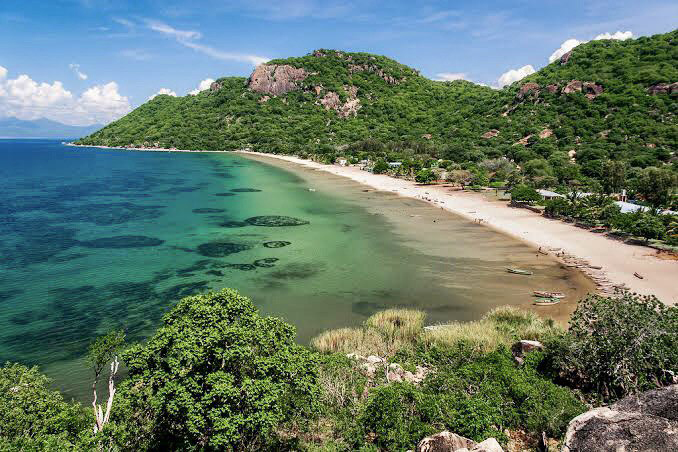
Namaso Bay with Nkudzi Mount in Background. Picture: allianceearth.org
McKaye has been working in Lake Malawi for more than 40 years, first with Yale University, then with the World Wide Fund for Nature (WWF) and now with his own organization called HEED, which stands for Health, Education, Environment and Economic Development.
He is responsible for many of the fascinating fishy discoveries in the lake, which were instrumental in helping this hotbed of biodiversity become the world’s first freshwater National Park in 1980 and the first ever freshwater-based World Heritage site in 1984. According to him, there is fifty times more diversity in Lake Malawi’s fish than of the Galápagos finches that drove Darwin’s theories of evolution.
The United Nations Environmental, Scientific and Cultural Organisation, UNESCO, explains in its World Heritage listing that Lake Malawi National Park “is of global importance for biodiversity conservation, due particularly to its fish diversity.”
UNESCO goes on to say: “The property is an area of exceptional natural beauty with the rugged landscapes around it contrasting with the remarkably clear waters of the lake.” Which is “home to many hundreds of cichlid fish, nearly all of which are endemic to Lake Malawi.” When a species is endemic it means that it occurs in that location and nowhere else in the world. But the official protection this unique area has enjoyed for forty years is now in danger of being removed.
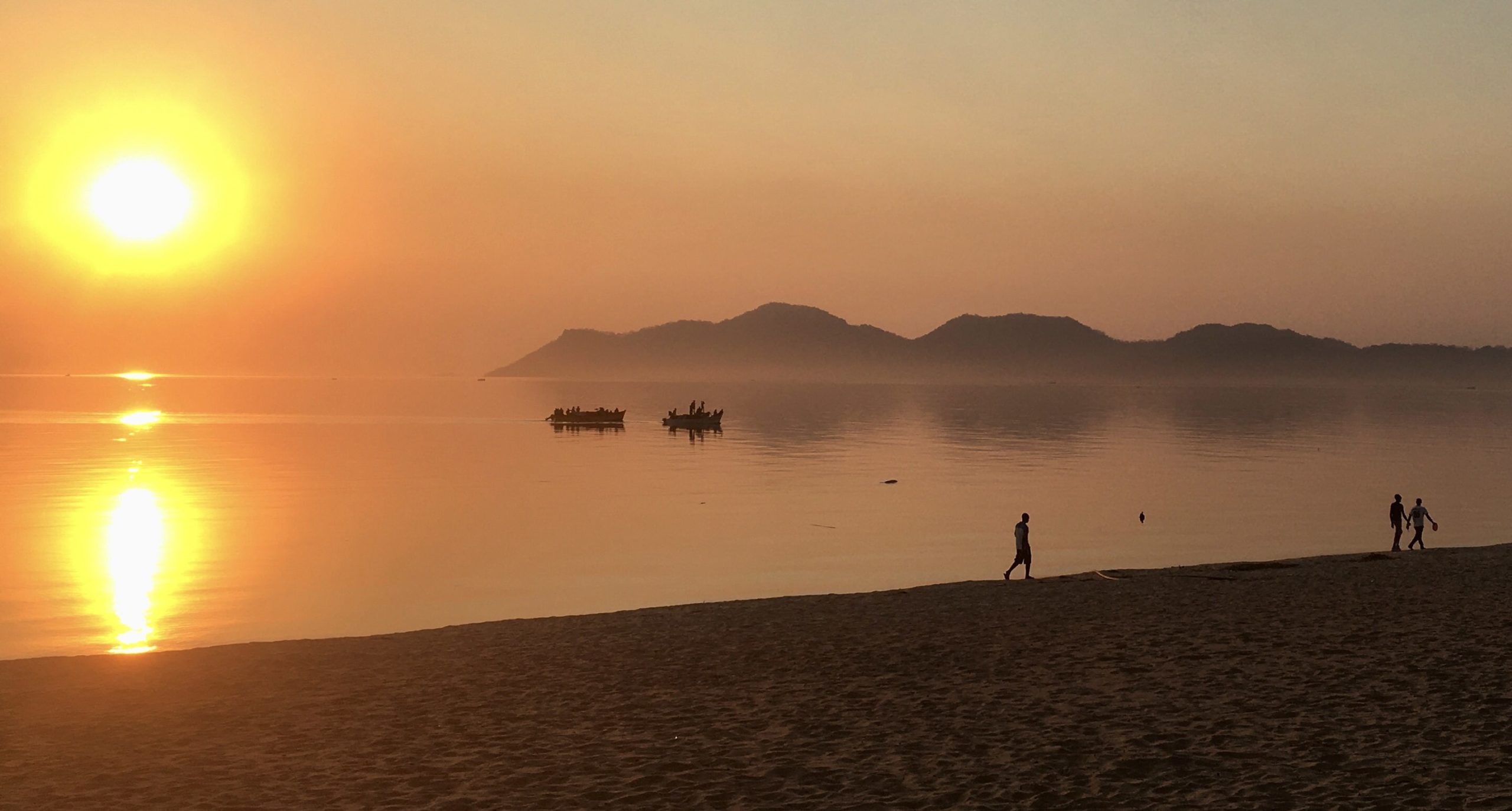
Lake Malawi National Park- Cape Maclear. Picture: allianceearth.org
According to government documents, the Malawi Government has acquired funds from The Kuwait Fund for Arab and Economic Development to extend the nearby town of Mangochi’s water supply system by creating a large dam inside the southernmost part of Lake Malawi National Park, on top of the Nkudzi Mountain. “The over 300 m mountain is a spectacular feature” explains McKay, “with well over 100 species of cichlid species there and probably 1/3 of them are undescribed by science.” That means, he said in a recent email, that these are potentially new species. “I would estimate at least 10 are endemic to that rocky outcropping.”
In a world rapidly losing biodiversity, new species are exceedingly rare.
Civil society groups argue that the project is based on a badly flawed environmental impact assessment, which included no alternative site evaluation as required by Malawian law, and zero estimates of impact on the three main points of value for the park’s World Heritage Status, including its natural beauty, current ecological processes and the park’s outstanding biodiversity.
Nkudzi Mountain is virtually the only area spared the rampant deforestation that is common throughout this country of 18 million people, and also hosts unique rock paintings and other archeological discoveries that reveal the ancient heritage left from the original inhabitants of the lakeshore, explains Herbert Mwalukomo from the civil society organization Centre for Environmental Policy and Advocacy.
He says that laws to protect the environment have not been followed, and fears that bulldozing the top of the mountain and plowing roads through the forest will dramatically affect the conservation status of the site. However, Mwalukomo points out that what is driving the development at the moment is pressure from the Malawi government. “The political pressure to have the project approved…. is really so huge.”
UNESCO acknowledged that they are aware of the danger the project poses to the World Heritage property. Muhammad Jama, the head of UNESCO’s World Heritage Centre’s Africa unit, said in a September email that the UN body is “in exchange with the national authorities to ensure that the Impact Assessment process would follow the provisions of the Operational Guidelines for the implementation of the World Heritage Convention.”
Those guidelines clearly state that “protection and management of World Heritage properties should ensure that their Outstanding Universal Value, including the conditions of integrity and/or authenticity at the time of inscription, are sustained or enhanced over time.
“This mountain provides a refuge and sanctuary to a number of rare and threatened animals including the pangolin, but also birds, reptiles, snakes, fish and insect species -some only found in this area and nowhere else on Earth.” Says Malawian environmentalist Reza Sacranie, who lives next to the mountain.
He has been seriously concerned about the dam from when he first heard about the project about six months ago. He feels the dam indeed endangers the integrity of the park and its World Heritage status. “If the project is allowed to go ahead as envisioned, it will cause irreparable damage to the most pristine and thickly wooded area” of the park, he explained on a recent phone call. “The unavoidable erosion and siltation caused by the construction of an access road, tanks and houses on Nkudzi Mountain will muddy the pristine waters.” Communities surrounding the area have created an online petition opposing the project in the park, asking to have the dam moved to a more suitable location.
McKaye worries that the dam, and its construction, could seriously harm the critically endangered fish habitat below the mountain. It is “absolutely outrageous that this could be allowed in the first freshwater National Park in the world”.
Mwalukomo agrees that the potential effects of heavy machinery, runoff, potential chemical spills and erosion on these extremely rare fish species have not been included as potential environmental impacts in the government’s current environmental assessment. He also points out that there are other hills nearby which could host the project, including one with a road, electricity and a radio tower outside of the protected area, but says this was not covered in a comparative way within the environmental assessment, as required by Malawian legislation.
Sacranie, who has been fighting for environmental protection for Lake Malawi for decades, notes that the nearby deforested hills would make much more sense for a project like this, and they are all outside the park. “There are multiple suitable alternative sites which do not threaten the Lake Malawi National Park’s World Heritage status.”
McKaye agrees with Sacranie. To protect the environment, and supply safe and clean water to people in this mountainous country, “all you have to do is put the water project outside of the National Park.”
The water project, designed by the Malawi government’s Southern Region Water Board, seeks to charge people a fee for the water the project would supply. At the moment, Malawians either drill and maintain their own boreholes, use river water, or get water directly from the lake.
Sacranie sees a clean water project for the region as important for health and development, but also believes the financial model the government is using to justify the current plan is deeply flawed. “Malawi does not have to risk losing such an area of outstanding universal value and being stripped of World Heritage Status to provide piped water, at a fee.”
Indeed the government has made it clear that the money from Kuwait is a loan, and will have to be paid back by charging subsistence farmers and fishermen for water that is free at the moment. Sacranie points out that Malawi is one of the world’s least developed countries, so it is unclear where the government believes people will get money to pay for what is currently a free resource.
Malawi’s sustainable tourism revenue is nearly fifty million US Dollars a year and most of the tourists who visit the country come to swim with the fish in the sparkling waters of the park. Mwalukomo says that alternative sites outside of such an important foreign exchange earner for the country would cost less than bulldozing Nkudzi Mountain, and that lost revenue from tourism should be included in any cost-benefit analysis of the dam project.
After returning from a recent diving trip filming the lake’s impressive biodiversity with members of a famous nature show, McKay said he was no less committed to protecting the fish in Lake Malawi than he was when he came here in the early 1980s. “This is the most impressive biological wonder of the world.”
In the dark shade of Nkudzi Mountain life goes on for the rare cichlid fish of Lake Malawi. Some hunt around corners, some graze algae off the rocks, and some play dead, lying in ambush for their next unwary meal. Whether these are their final acts remain to be seen.
The Malawi government did not respond to questions about the project.
Jeffrey Barbee is an award-winning journalist whose work is commissioned by National Geographic, The Guardian and other newspapers and magazines. He is also the founder and director of Alliance Earth, which supports independent environmental and scientific reporting.
ALSO READ
Two wheels and a dream: Moroccan adventurer’s solo cycle around Africa

